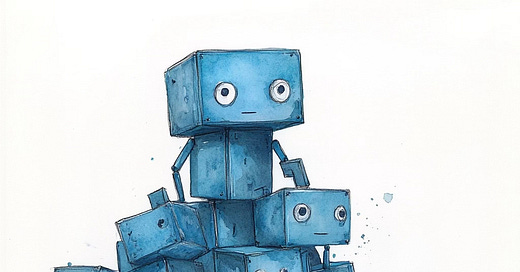A Subtle Shift
Agentic. Google dropped the term to close out 2024 with one last marketing punch. And let’s be honest—it hits.
But something about it lingers in the ear—an uncanny echo of an age antic, that of argentic (silver-based film photography). A mere phonetic coincidence? Unlikely. One captures a moment; the other executes it.
Argentic demanded choices. Every shot was a decision, a commitment, a risk.
Then came digital photography—fluid, effortless, limitless. More pixels, endlessly filling up servers on the other side of the world.
Images multiplied. Diluted. Devalued. A photo costs nothing anymore… so does it still mean anything?
No pain, no g(r)ain.
Agentic seems to be following the same path. Agents propel us into an era of instant, frictionless execution.
More agents… but less agency? As we surrender pieces of our autonomy, we forfeit something greater—our ability to shape, transform, and influence the world.
We also relinquish the power of intention. And without intention, is an action still an act?
The Illusion of Limitless Progress
Agentic technology promises infinite productivity, flawless execution. Faster, smoother, more efficient.
But in the rush to automate without improvisation, we execute without questioning. And in optimizing everything, we don’t create more value—we smooth out what once had meaning.
We thought we were lightening the load. Instead, we’re just filling it differently.
Because some resources don’t multiply. Time, for instance.
It can’t be compressed—it simply expands to fill the space available. Parkinson’s Law in action.
AI doesn’t lighten the burden; it increases the tempo.
We set out to reduce the workload, but we only raised the bar. A designer who once produced 10 visuals a week? Now expected to churn out 50. It’s no longer a feat—it’s the new baseline.
Agentic doesn’t simplify—it accelerates. The time it “frees” isn’t time gained, it’s time repurposed.
Progress is here… but freedom? Still up for debate.
Welcome to the (C)ouch Economy!
Agentic technology promises to handle everything for us—buying, deciding, executing. The ultimate luxury: total and permanent free time. A world where even lifting a finger will feel archaic.
But let’s ask ourselves—what will these agents actually do?
99% of the time, they’ll just indulge fleeting whims—just like quick commerce before them.
Getting a frozen pizza delivered in 10 minutes? Sure, that’s possible.
Watching a bot book your next vacation? Also possible.
Yes, it’s possible… but is it desirable?
Do I really need an autonomous, costly, energy-guzzling AI—just to watch it buy a can of paint from Walmart while I finish my bag of kale chips?
Capitalism, having run out of new objects to sell us, now offers the illusion of time freed from all constraints… including ourselves.
Let’s Be More Mary Than Martha
In the Gospel, Jesus visits two sisters. Martha is busy—serving, organizing, rushing around. Mary, on the other hand, sits and listens. Frustrated, Martha calls on Jesus to intervene. He replies: “Mary has chosen what is better, and it will not be taken away from her.”
This passage is often read as a tribute to contemplation. But maybe it’s saying something else.
Martha fulfills her duty, meeting expectations. Mary, however, chooses. She chooses where to focus her attention, where to spend her time, where to exist.
How do we become more like Mary than Martha? By being present to everything—except obligations.
On an individual level, this is a delicate balance. But at a systemic scale, the nuance vanishes. Agentic technology pushes this logic to the extreme: it neither acts nor contemplates. It simply erases the need to be.
We think we are unburdening ourselves—automating, streamlining, delegating. But what’s left of a human when there’s nothing left to do?
Our era has made work an identity. And when agentic automation takes it away, nothing remains—not even time itself. Because time without necessity becomes an empty space, something to be filled at any cost.
Every gain in productivity doesn’t free us—it reconfigures us. What was once progress becomes the new norm. What was once an opportunity becomes an obligation.
So, what do we do?
We set our own limits. We decide what we fill and what we leave empty.
Agentic technology draws straight lines. It’s up to us to bend them.
Because progress was never the problem. The real danger is losing meaning along the way.
The Pirate Instinct Awaits
Humans will always resist a perfectly oiled machine. We have a unique talent for bending, subverting, and rewriting the rules.
It’s not a bug—it’s the feature.
History isn’t shaped by perfection but by its ability to be outmaneuvered.
Where agentic technology seeks to smooth everything out, humans know how to jam the gears.
Maybe our true role isn’t to comply—but to hack the system.
Pirates, tinkerers, and misfits have always found ways to repurpose the tools imposed on them.
Perhaps our future isn’t to be passive consumers of agentic tech… but to be the ones who twist it to our will.
What if we didn’t just use AI agents but created new masters—only to defy them?
We killed the idea of God with science.
But have we truly abandoned our need for a demiurge? Or are we simply searching for a new one—to hack, to challenge, to tear down… so we can rebuild once more?
We think progress comes from order. But it’s always disorder that saves us.
MD & KP
Former entrepreneur and co-founder of the Magma newsletter, Kevin now writes Le Bateleur, a French newsletter—a space for exploration where he shares new ideas to think, create, and reinvent oneself.





